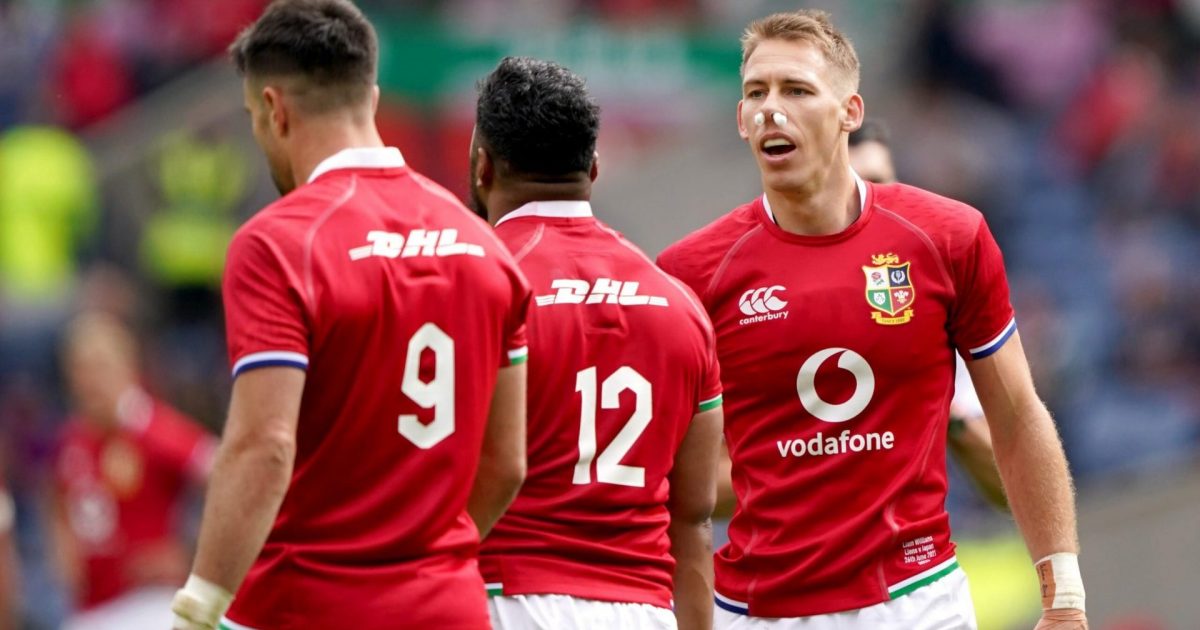Ref Watch: Lions let off hook in phoney war, Carley delivers on big stage

Wayne Barnes and Nick Mullins have become two staple items at Gallagher Premiership finals in recent years.
TV viewers doubtless made up their own minds about Mullins’ absence; I was almost won over by Ali Eykyn’s “a try for the ages” but still missed his mellow tones.
But – and this is a massive compliment – surely very few will have given a second thought to the identity of the referee since Matthew Carley delivered a composed and accurate display which played a key part in a memorable final.
Barnes has previously appeared in nine domestic finals, but Carley is no longer the new kid on the block. He has over 100 Premiership games, several years of international rugby and a World Cup behind him, oozes self-confidence and is clearly cut from similar cloth to the Gloucester barrister.
In fact the similarities are striking. Both have a quiet authority which gives them the ability to manage even the most keenly-contested match with minimal amounts of fuss while their biggest strengths are found in two key areas – communication and decision-making accuracy.
Whether speaking to the front rows, the TMO or the captains Carley delivered concise, clear messages in a style which left no-one in any doubt about who was in charge but without being showy or overbearing.
An important but perhaps easily overlooked aspect of this is that Carley’s every word is heard by the viewing audience – either on TV or via ref link in the stadium.
There is simply no room for dithering or for operating outside the agreed protocol any more since we all witness – and scrutinise – the referee’s every word. Referees who relied on personality and the odd cutting quip were once legendary, but perhaps sadly, they are now a thing of the past among our sport’s upper echelons.

Carley’s use of the TMO only as a last resort spoke volumes about his confidence in his own decision-making ability, positioning and fitness. It hugely helped the flow of the game that TMO checks were done ‘on the hoof’ while play remained in progress.
Interestingly, it was also noticeable that the touch judges (sorry, I just can’t do ‘referee’s assistants’) were more prominent on the audio feed than is nowadays usually the case.
In particular, Luke Pearce played a key part in the award of a try grounded in a pile of bodies without the TMO being called into action.
| Quarter 1 | Quarter 2 | Quarter 3 | Quarter 4 | |
| Pens against Exeter | 3 | 7 | 1 | 1 |
| Pens against Harlequins | 4 | 3 | 2 | 3 |
Moving to specifics there were two talking points worthy of further comment.
Jonny Hill and Marcus Smith Yellow Cards
Although both yellow cards were awarded in very similar situations, the process by which Carley got to the two decisions were entirely different.
The Lions’ second row was the fall guy following the award of a penalty try when the Chiefs pack were caught out by Harlequins’ lineout drive.
In their desperation not to concede an early score to a maul from which they had become detached, a number of Exeter forwards rejoined from the side. This caused the maul to collapse short of the line and Carley determined that a try would otherwise probably have been scored and awarded a seven-pointer.
Law now states that the official MUST also yellow card the perpetrator providing he is identifiable – which to Carley he clearly was, since the TMO was not brought into use.
By contrast, Exeter did score a try despite Smith’s maul entry-point transgression. In normal circumstances this would be deemed adequate advantage and therefore would not lead to the additional award of a yellow card.

However, Carley was clearly tiring of Quins’ continual concession of penalties in their own 22 and had already issued Stephan Lewies with a formal warning.
It is also important to remember in this scenario that a counter is ticking inside a referee’s head. Harlequins had conceded three penalties during that Exeter attack, but I also counted three further penalty advantages – all of which are part of the ‘totting up’ process.
Smith’s transgression was therefore the seventh infringement and with a warning having already been issued a visit to the sin bin was inevitable.
Luke Cowan-Dickie Penalty Try?
In commentary Austin Healey cleverly picked up an infringement from Exeter’s Luke Cowan-Dickie which he suggested may have merited the award of a penalty try.
The Chiefs forwards were slow disengaging from a defensive scrum and by the time their hooker had retreated towards the defensive line at the next breakdown he found himself perfectly positioned to make a crucial tackle.

Since he had never retired behind the breakdown’s offside line and had clearly then made a material impact on the next phase, the soon-to-be Lions front-rower was offside.
However, play was still more than five metres from the Exeter line, and while a try was a distinct possibility without Cowan-Dickie’s intervention, Harry Williams’ close proximity meant it could not be deemed as a probable (and therefore penalty try worthy) outcome.
Since none of the officials picked up the offence it went unpunished. It came in the middle of a nine-minute sequence which saw Exeter concede five penalties so given its ‘red zone’ context it is possible that a yellow card would have followed.
British & Irish Lions v Japan
When Pascal Gauzere made two huge howlers to help Wales to Six Nations success against England very few of us had him anywhere near the shortlist of names to referee the Lions a few months later.
Covid-19 travel restrictions and the demands of bubble life have of course changed a lot of things, and in his defence Gauzere did a good job at Murrayfield in his final whistling appointment before the curtain came down on an 11-year international career.

In fact, this award of a nice showpiece as a career-ender spoke volumes about the occasion, which in all honesty lacked intensity and felt more of a getting-to-know-you exercise than a full-on international.
From a refereeing perspective there was also a couple of situations that I suspect most top officials would have handled very differently in the white-hot temperature of a competitive test match.
Despite the loss of Alun Wyn Jones and Justin Tipuric, the Lions were well in control of a contest in which Japan were losing the battle of the gainline for much of the first half.
However, when the Cherry Blossoms did finally apply some pressure Courtney Lawes was forced to kill the ball a few metres from his own line in order to stop the momentum – a cast-iron yellow card – which instead passed without even a warning being issued.
Similarly, Robbie Henshaw’s high tackle early in the fourth quarter – which saw contact made with the head when he over-reached from a side-on position – was penalised but not reviewed by the TMO or considered for further sanction.
| Quarter 1 | Quarter 2 | Quarter 3 | Quarter 4 | |
| Pens against Lions | 1 | 4 | 1 | 7 |
| Pens against Japan | 3 | 5 | 3 | 1 |
Gauzere showed good empathy with the different approaches of the two teams in how he subtly adjusted his approach to refereeing their respective setpieces.
Japan rely on quick ball which by insisting on a high and stable scrum engagement position and penalising the Lions for an early push at the first setpiece, Gauzere gave them every opportunity to achieve. As a consequence, of their seven scrum feeds, Japan won four pieces of possession at the first time of asking, were awarded one penalty and only had to reset twice.

By contrast he was happier for the bigger home pack to use their power which he then rewarded with the award of two penalties from four feeds.
Similarly, his consistent insistence on a very big lineout gap prevented much disruption to the Japan throw – while the Lions finished with a perfect 16-from-16 return.
As a Lions fan let’s hope South Africa’s monster pack are required to adhere to similar setpiece standards!

























































